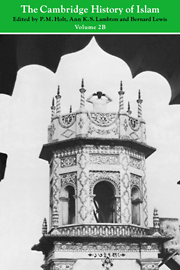Book contents
- Frontmatter
- Introduction
- PART VIII ISLAMIC SOCIETY AND CIVILIZATION
- 1 THE GEOGRAPHICAL SETTING
- 2 THE SOURCES OF ISLAMIC CIVILIZATION
- 3 ECONOMY, SOCIETY, INSTITUTIONS
- 4 LAW AND JUSTICE
- 5 RELIGION AND CULTURE
- 6 MYSTICISM
- 7 REVIVAL AND REFORM IN ISLAM
- 8 LITERATURE
- 9 ART AND ARCHITECTURE
- 10 SCIENCE
- 11 PHILOSOPHY
- 12 WARFARE
- 13 THE TRANSMISSION OF LEARNING AND LITERARY INFLUENCES TO WESTERN EUROPEo
- Dynastic List
- Bibliography
- Glossary
- Index
- References
5 - RELIGION AND CULTURE
from PART VIII - ISLAMIC SOCIETY AND CIVILIZATION
Published online by Cambridge University Press: 28 March 2008
- Frontmatter
- Introduction
- PART VIII ISLAMIC SOCIETY AND CIVILIZATION
- 1 THE GEOGRAPHICAL SETTING
- 2 THE SOURCES OF ISLAMIC CIVILIZATION
- 3 ECONOMY, SOCIETY, INSTITUTIONS
- 4 LAW AND JUSTICE
- 5 RELIGION AND CULTURE
- 6 MYSTICISM
- 7 REVIVAL AND REFORM IN ISLAM
- 8 LITERATURE
- 9 ART AND ARCHITECTURE
- 10 SCIENCE
- 11 PHILOSOPHY
- 12 WARFARE
- 13 THE TRANSMISSION OF LEARNING AND LITERARY INFLUENCES TO WESTERN EUROPEo
- Dynastic List
- Bibliography
- Glossary
- Index
- References
Summary
PREFATORY REMARKS
Islam is a religion. It is also, almost inseparably from this, a community, a civilization and a culture. It is true that many of the countries through which the Qur’anic faith spread already possessed ancient and important cultures. Islam absorbed these cultures, and assimilated itself to them in various ways, to a far greater extent than it attempted to supplant them. But in doing this, it provided them with attributes in common, with a common attitude to God, to men and to the world, and thus ensured, through the diversities of language, of history and of race, the complex unity of the dār al-Islām, the ‘house’ or ‘world’ of Islam.
The history of the Muslim peoples and countries is thus a unique example of a culture with a religious foundation, uniting the spiritual and the temporal, sometimes existing side by side with ‘secular’ cultures, but most often absorbing them by becoming very closely interlinked with them. It is with the relations between this existing culture and the strictly religious features concerned that we shall try to concern ourselves in this chapter.
Historical landmarks
Between the first/seventh and the ninth/fifteenth centuries, Islamic lands reached great cultural heights. We shall not attempt to outline here all the background of this, still less to draw up an exhaustive catalogue of works and of names. At certain periods the researches, the arguments of the schools and the political repercussions to which they gave rise, the intellectual achievements and the works of art were so abundant that to try to record them in a few pages would be to give an unjust picture of their dynamic qualities. The names which we shall mention therefore will be cited only as examples.
Keywords
- Type
- Chapter
- Information
- The Cambridge History of Islam , pp. 569 - 603Publisher: Cambridge University PressPrint publication year: 1977

